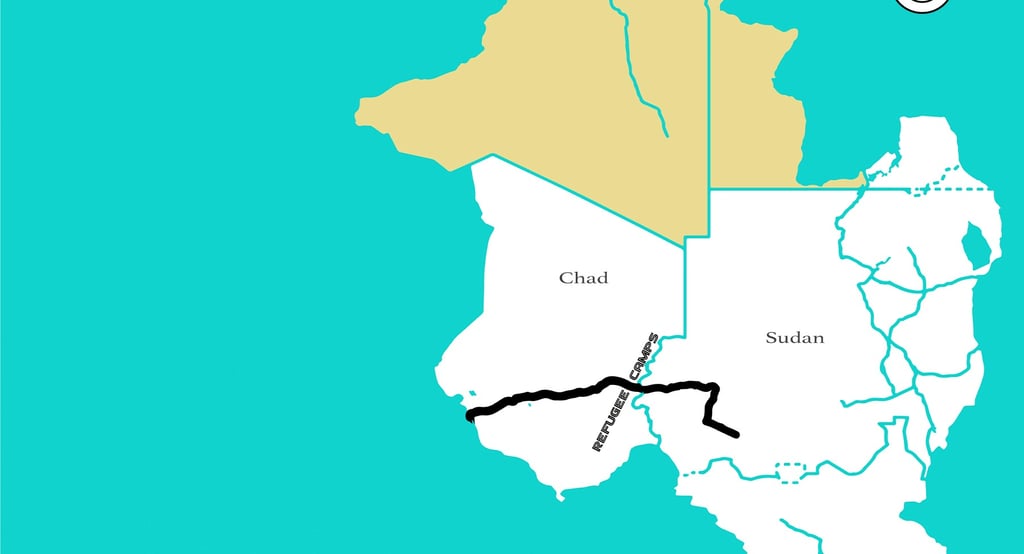Sudanese Refugee Evacuation in Adre Camp
Sudanese Refugee Evacuation in Adre Camp by Chadian Government


Sudanese Refugee Evacuation in Adre Camp by Chadian Government
The Sudanese refugees amidst the harsh conditions in Adre camp are experiencing disruptions as the Chadian government is forcing the evacuation of the residents. The host residents are demanding the return of their land due to its suitability for agricultural use and its close proximity to the town. The refugees have refused to evacuate and the majority of the population has opted to return to Sudan. However, the Chadian soldiers are preventing them from leaving. This highlights the complex dynamics between the needs and desires of refugees and the security measures imposed by the host government. The United Nation (UN) and other humanitarian organizations have come to an agreement with the Chadian High Commission to allow the refugees 3 months to evacuate.
This collaborative agreement aims to balance the refugees' wishes to return to Sudan or evacuation to other camps with the government's concerns regarding security and agricultural use of the land.
Historical Background
Chad is hosting over 600,000 Sudanese refugees, a number that continues to grow due to the escalating violence and looming famine in Sudan. Chad has received the largest share of people fleeing Sudan due to the renewed historic assault on non Arab residents throughout the western Darfur region, placing a heavy burden on the already impoverished nation. The influx of refugees strains the country's limited resources and camps, exacerbating existing challenges.
Adre camp, located 27 km from Geneina situated in the Ouaddai region eastern Chad, now home to over 150,000 Sudanese refugees has become a crucial refuge for Sudanese fleeing the ongoing violence and humanitarian crisis. Due to its strategic location it is one of the first points of refuge for those crossing from Darfur.The population is diverse, including a significant number of women and children, many of whom are survivors of extreme violence and trauma.
Refugee-Local Tensions and Conflicts
A tragic incident occurred in Adre market Chad, where a random shootout occurred resulting in the death of an 18 year old girl. According to the mothers testimony, “in the evening around 7:00 pm the girl was in the market assisting her mother close their small shop. Suddenly, gunfire erupted, and she was caught in the crossfire”, a tragic victim of the violence by Chadian soldiers. Her mother is heartbroken, having fled western Darfur last year 16th June to seek for safety and security only for them to encounter the same devastating fate in Adre.
Immediate chaos ensued after the incident resulting in disturbances among the local population. The local authorities were forced to impose a curfew and closed gathering points to restore order and prevent further unrest.
A recent decision by the Chadian government to evacuate Sudanese refugees from Adre camp to a new site in Daqan, approximately 150 km away underscores the pressures and challenges in managing refugee community. The move was prompted by local demands to reclaim land for agricultural use, internal conflicts among refugees, and incidents of violence and theft within the camp. The situation proves difficult as the refugees refuse to leave because of the area's proximity to water resources and their homes, as well as their familiarity with the environment they have grown accustomed to.
The refugee camps around Adre have seen significant violence and disruption, exacerbating the already strained relations between the local people or host community and the refugees. The shooting incident has further heightened these tensions, leading to increased security measures and stronger military presence in the area and eventually, the forced evacuation of the Sudanese refugees. Adre’s governor has expressed concerns about conflict spilling over into Chad, emphasizing the need for comprehensive humanitarian support to prevent ethnic violence and ensure peaceful coexistence within the camp.
The relocation process is facilitated by the Chadian government, UNHCR, and other humanitarian organizations. Efforts include ensuring basic needs such as food, water, shelter, and medical care are met for the refugees in order to improve the living conditions for the
refugees. However, the ongoing relocation to Daqon camp reflects the broader challenges of managing large scale refugee crises in resource strained environments and highlights the need for continued international support and funding to ensure the safety and wellbeing of displaced people.
